#its just cut and she has been brutally killed
Text
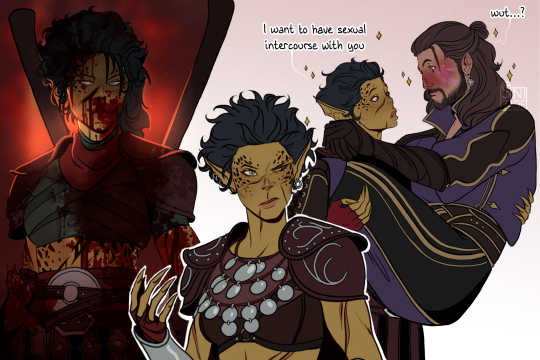
Qih'Za, The Demon Slayer
Class: Paladin fighter (Oath breaker)
Romance: Gale (no god Gale, only normal nerd Gale)
Besties: Lae'Zel / Karlach
Qih'Za was the last egg to hatch in her Creche which made some of the other older Githyanki think that she would be a weak child among the others, but they ended up very mistaken as ever since she was able to hold a sword for the first time, she has always shown a clear mastery of whatever battle or training she was in. The problem that always resulted in severe punishment for Qih' Za was her curiosity... Training outside her Creche, field missions, she always left the training of the youngest to find out what was more beyond what her eyes could see and this always caused irritation in the elders, her lack of obedience and discipline were irritating in their eyes.
During her teenage years, she was the proudest point of her Creche, the first Githyanki to kill a demon with her own hands. One of the Githyanki from their Creche was using his magic to try and summon little imps to use in combat and something went terribly wrong causing a flesh and blood demon to appear right in the middle of them killing and beheading everyone in sight no matter if they were children or teenagers. Qih'Za was quick, brutal, almost animalistic against that demon, cutting off its horns, wings, tail, she was hateful and dangerous, almost no longer controlling her body and it was from that day on that she became known as the Demon Slayer, but what was a source of pride and admiration for her Creche and other Githyanki outside of it, for Qih' Za it was a trigger for some kind of disorder in her mind, seeing all these children, seeing her friends and teachers get killed in such a brutal way caused her to have small tantrums throughout her life whenever she was in combat, useful against enemies, but she lost control and always ended up attacking allies and her superiors ignored this due to her usefulness in battle, which always left her with the blood of her brothers and sisters on her hands and even more trouble on her mind.
Against her will she became a dragon rider, it was a "gift" offered by the best and most honorable warrior in her Creche and she shouldn't dare refuse. Receiving her dragon seemed to bring her more comfort... It was strange at first, but she created a great bond with her dragon, her friend, her glorious Agynih. Her first battle with her dragon was something that would never leave her mind... Seeing her dragon, her friend being killed by an Ilith ship, having her body absorbed into that incubator against her will... She just wanted to get out of there, she needed to get out of there.
Even though she didn't have much attachment to magic and even a certain fear due to her trauma, the way Gale showed it seemed to be less scary and more "simple", even beautiful in her view, he was a good teacher, a very intelligent human, there were few big noses that Qih'Za met who actually managed to have her admiration and Gale aroused both admiration and attraction. Even though he wasn't very strong, he made up for it with his mind and spells, he was fast and lethal, his body was firm and concentrated that seemed to flex with each glow that came from his hands and staff. Qih'Za wanted to try him, not just that, she wanted to devour Gale completely, feel his skin against hers and submit him to her.
She stayed with Gale and traveled with him to Water Deep... Even though her mind told her to go with Lae' Zel to fight for the freedom of her people and fight to spread the words of her prince Orpheus, that was no longer life for Qih' Za and now her heart is with Gale... She had been through so much, felt so much... She knew well that Lae'Zel was more than capable of such a mission, that she would free her people and become a legend among all Githyanki. Her companion, her friand and her sister
Some extra information about Qih' Za
She's love chocolate ever since she stole one from a big nose she found sleeping near her Creche, so now that she's trying to find a way to get this parasite out of her mind, she always tries her best to find a few more chocolates.
She's afraid of Raphael and Mizora... Not just ordinary fear, but something that makes her vision blur to the point where she almost loses control of her body again.
She hasn't had a good night's sleep since she found out about Astarion... He wasn't trustworthy, he didn't seem trustworthy and he didn't even talk like someone trustworthy, if he hadn't been so helpful with locks she would have already ripped his head off.
She wanted to taste Wyll when she first saw him, a strong and brave human, strong body almost as if waiting to be touched, but finding out about Mizora made her hateful about him.
#githyanki#Qih'Za#gale of waterdeep#gale dekarios#bg3 gale#gale x tav#baldurs gate gale#baldurs gate#baldurs gate 3#baldur's gate 3#baldur's gate iii#baldurs gate fanart#baldurs gate tav#drawing#drawings#characterdesign#draw#sketch#digital drawing#character#drawn#sketchbook#Qui'Za
690 notes
·
View notes
Text
i need to flesh this out once i’ve mulled it over more but i adore how limbus company expands on the incredible world-building of project moon, because it is so goddamn realistic.
from the outset the player is presented with this incredibly bleak world in which corporations have become the state. the poor and the desperate bow their heads and toil at the altar of the free market. worth is measured by talent in exploitation. it’s a social darwinist’s wet dream. i also think the choice to base the cast off of literary figures was amazing, because it highlights very important connections to the past. i haven’t read all the books referenced, but the ones i have (the metamorphosis, don quixote de la mancha, & the odyssey so far) draw an unmistakable through-line from the suffering and exploitation depicted in those books to that which occurs in the city. the most horrifying parts of this game in my opinion aren’t the monsters or the machines — it’s the sheer enormity of human suffering which exists in the economic and political system the city operates under. and that’s the worst part, because in so many ways, the suffering and exploitation portrayed in the city is not a hypothetical fantasy — this is just capitalism working as intended. it’s not confined to the historical context of those books, nor the gritty sci-fi horror of the game.
but not only do we have this incredible setting that’s somehow both brutally realistic and fantastical at the same time, we also get to see how our main cast attempts to survive in that world — and ultimately how none of their attempts to change it succeeded at all.
in my mind, canto i portrays how neither kindness nor cold-heartedness will help you survive — especially through the dynamic between aya and hopkins. gregor has been both. he was a war hero in a meaningless war. after it ended, he was discarded as any tool which had outlived its usefulness would be. he can’t even control his arm from becoming a killing machine. and yet, gregor is still exceptionally personable, even going out of his way to be kind at times. but no matter whether he’s a tool for violence in the hands of war profiteers or simply a man doing his best to protect others, he still couldn’t save yuri — just as he couldn’t save his comrades — and this clearly haunts him. neither the war nor its end changed anything.
canto ii shows between rodya and sonya how both direct action and an “inevitable” revolution fail to quell the suffering of the vulnerable. sonya’s revolution is all bluster and no action. he does nothing to help the people in his community in favor of this grandiose revolution that must happen at the “right moment” — even if it means leaving his neighbors to starve in the meantime. rodya’s inspired yet short-sighted action to remove what she saw as the source of her community’s suffering only led to its destruction: the tax collector was a branch, not the root, of the problem, and killing one person did nothing to stop the system which upheld them.
canto iii is even more clear-cut in the ties between sinclair and kromer: neither violent zealotry nor blissful ignorance will save you in the city. kromer’s cult does not “purify” anything, but sinclair’s courage to stand up to her isn’t enough to beat her either. canto iii still doesn’t end in a victory. dante and the sinners barely survive. it’s only through demian (and k-corp’s) divine intervention that the sinners and kromer don’t destroy each other in the corpse pit.
in the most recent addition, canto iv appears to do the same thing. on one hand, you have the devotion to a principle shown through shrenne, samjo, and donbaek. their causes are different, but their devotion is the same. on the other, there is the cynicism, indifference, and escapism of yi sang and dongrang, both willingly complicit in the machine in different ways. and yet — none of them make any positive difference. whether they resisted or submitted, the machine grinds on around them — the only choices are to become a cog in it or be ground to bits by its gears.
to be clear, i do not think the game is arguing that none of these individual actions matter. even if gregor couldn’t rescue yuri, even if rodya couldn’t protect her neighbors, even if sinclair couldn’t defeat kromer and all that she stood for, even if the league of nine members each failed to realize their ideals — limbus argues that it matters they tried. it matters that they’re still trying. it may never be possible to oust the corporate overlords and make the city a better place, but the love still matters.
#canto four spoilers#canto iv spoilers#canto iv#THIS IS ILL THOUGHT OUT SORRY#bad metaposting moments#i just need it Out my brain or ill Esplode#limbus company
635 notes
·
View notes
Text
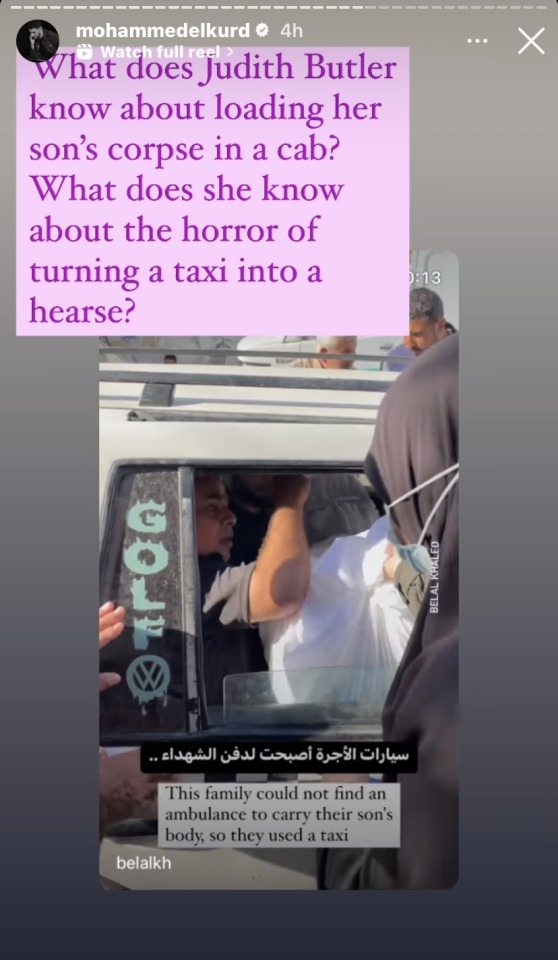
What does Judith Butler know about loading her son’s corpse in a cab? What does she know about the horror of turning a taxi into a hearse?
im so mad. i've been in mourning and a state of constant rage for palestine for the past few years, and these past weeks have been especially devastating. while im not palestinian myself, i have friends and family that are, and i cant help but be on edge about the things they cant afford to think about right now.
i read their 'thought piece'. its nothing new on that front, and thats why it makes me so mad. im really struggling to connect with the blind, white-american privilege of calling for non-violence in the face of a genocidal apartheid regime. the fucking gall of these so-called western intellectuals to preach how rampant anti-intellectualism has become just to turn around and buy into some colonial playbook of peace shit is hilarious. people i thought were with me on this, not only on palestinian liberation but on liberation full stop, have been a constant disappointment. i cut off so many ppl i called friends over the absolute lack of grace and empathy they handled this with. when are white western 'activists' going to stop treating us like timed bombs of irrationality?
this part in particular kept coming up and made me feel like i was going insane:
"When, however, the Harvard Palestine Solidarity Committee issues a statement claiming that ‘the apartheid regime is the only one to blame’ for the deadly attacks by Hamas on Israeli targets, it makes an error. It is wrong to apportion responsibility in that way, and nothing should exonerate Hamas from responsibility for the hideous killings they have perpetrated...The necessity of separating an understanding of the pervasive and relentless violence of the Israeli state from any justification of violence is crucial if we are to consider what other ways there are to throw off colonial rule"
literally nobody is asking anyone to 'exonerate' hamas. hamas is a military organization fighting the US-backed israeli occupation with smuggled weapons that is active in 365 km² at best. hamas is not even in the orbit when it comes to comparisons to israel.
israel said it with its own mouth that hamas is a product of israeli occupation. this isnt a matter of opinion, right? or am i too far left to think that a brutal occupation will radicalize its victims? and they gave them the means to become a 'terrorist organization'? how are you claiming to care about palestinians if you don't bother unsubscribing from the very schools of thought that constructed the occupation in the first place?
some of you 'leftists' have been lying about what you've been reading because where are the frantz fanon quotes you like to throw around, huh? where's the malcolm x, the angela davis? where are your insta posts with chomsky's books?
holy shit WHAT OTHER WAYS?
keep our communities out of your mouth. we are not some thought experiment you can exercise your conscience on. we're watching an ethnic cleansing unfold, and instead of supporting palestinians so many of you are playing out your own little fantasies of the 'progressive' solidarity you fail to show. sometimes, you need to fucking stop and listen instead of consulting the higher morality police on whether you need to 'contextualize' your incompetence.
#palestine#rant#im no saint but holy fuck some people are getting on my nerves#the personal is political
286 notes
·
View notes
Note
hi, you asked about the d20 finale drama. i have been following it- i have no idea how familiar you are with d20 as a whole, i know you said you werent keeping up with it so i'll try to explain as best i can!
the most recent season of d20 was fantasy high: junior year. fantasy high takes place in an 80s-inspired (but still has modern day tech- think movies like ferris bueller's day off or the breakfast club) dungeons and dragons setting (so like there are elves, halflings, etc). the main cast are high schoolers going to aguefort academy, where they are learning to be adventurers.
the season had a very disappointing ending for a lot of people. one of the main things that had been set up is that the PC party (the bad kids) had a group of foils, the rat grinders, who all were genderswapped and had the same classes and were generally approached as being foils. the leader of this group is 16 year old kipperlilly copperkettle, a halfling rogue with severe anger issues who, notably, was going to therapy for them but never seemed to improve. it's also later revealed that the rat grinders had been 'rage-starred'- implanted with crystals that make you incandescently angry. this was connected to their activities in sophomore year, where something happened and their cleric, lucy frostblade, died because she was unwilling to accept the rage star- she was later replaced by one of the PCs' younger brother.
it's also important to note that all of these foils had been groomed by their adult teacher, who wanted to bring back a goddess of rage and destroy all the other gods. so naturally a lot of people were like oh we're going to engage with themes of rage vs doubt and how mindless rage is a bad thing and rage vs justice.
um. that didn't happen. the penultimate & final episodes were a giant 'final battle' type of situation where instead of getting engagement with the themes of the story, we get all the characters angrily and brutally killing their foils (one character says they should cut off another (manipulated, mind controlled!) character's head off in order to make sure he can never be revivified; another character tells a 16 year old girl he's going to skin her, turn her into a rug, and have sex on top of her corpse). in the final episode, there is a for-real like half hour long segment where the PCs debate whether any of the 16 year olds 'deserve' to be brought back to life and eventually decide all of them can come back except for kipperlilly, because she willingly accepted the rage star. no acknowledgement that she was like still manipulated or that she was TRYING to get help, or her critiques of the bad kids or of the school or the system...). in the same episode, a PC says "it's also super black and white to think, like, this person was bad, or this person was good" and "they can be bad and still not deserve to be sliced in half" lol. like. okay but you just sliced like 6 teenagers in half?
it's not that i'm opposed to a dnd game where you slice teens in half, btw. it's just that it feels like you get these wildly opposing ideas of 'okay here are the themes that players & the dm are like Saying in roleplay and what they seem to want to believe, and here is what is actually happening in the story, and it's wildly dissonant and leaves a bad taste in my mouth'. (inb4 d20 stans come in and are like but its just an actual play you cant hold it to other artistic standards- Yes I Can lol).
so. yeah. i feel like it's a really good example of how dnd 5e just makes everyone push towards combat as the solution to stuff, and it's further worsened by the way d20 works where bc they make these huge set pieces, so many different campaigns end in like, a final battle on this (frankly gorgeous) miniature set up. which is lovely, but means that players and production and the DM are pushing toward combat as the resolution even when it doesn't necessarily fit, and makes them look towards combat as the only way out in a lot of situations. and it really makes roleplay suffer. i must also say that it's been widely acknowledged that this season of d20 suffered for like, a lot of shooting crammed into a short amount of time, so people really didnt have a lot of time to reflect on their decisions the way they did in sophomore year where they had like a week between sessions to think over the plot and what could happen and what's next.
Oh my god that is way fucking worse than I expected holy shit.
Anyway yeah i HAVE to think about how like.... the rules for combat in Thirsty Sword Lesbians by design use that combat as a way to create an emotional connection between combatants and set up roleplaying opportunities (instead of taking 1d8+4 damage, your opponent inflicts something like Angry or Insecure on you). One of the like dozen generic actions is to use Strings (emotional influence you can get from fighting someone) to like... influence people and change their perspective, often during a combat situation.
So like. Yeah. If THAT was what everyone's character sheet looked like I imagine they might have, yknow, tried to interact with NPC goals and personalities instead of interacting with their hit points
60 notes
·
View notes
Text
Hazbin Hotel - Vaggie Finale Thoughts
My thoughts on Vaggie are… complicated. I think the last two episodes of season 1 do a really good job with her and I love the beats her character hits, but the rest of the season didn’t build up to some of these beats the way they should have to make all of them hit as hard as they could.
I’m just going to jump right in to explain what I mean.
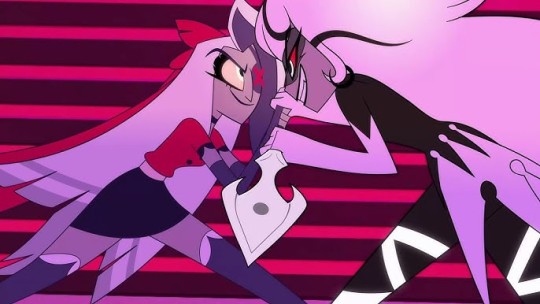
Vaggie’s role in episode 7 where she has to go convince Carmilla to help them face the angels is at its core fantastic and the song that they get together is a banger, but the basis for this song– that Vaggie is being driven by vengeance and has to fight for love instead– rings hollow.
Everything Vaggie has done this season has been for love. She’s been nothing but supportive of Charlie, putting all her effort into the hotel and Charlie’s mission. Her song and arc in episode 3 surround Vaggie’s belief and love for Charlie. Vaggie fighting for love has never been the central issue of her character because she’s been doing it all along.
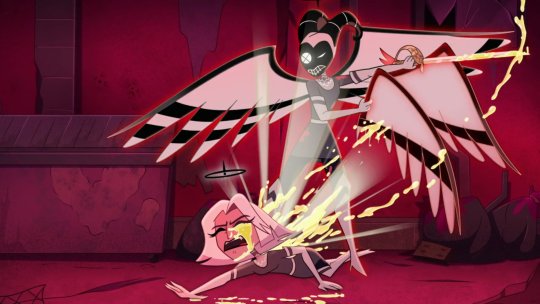
I like the idea of Vaggie being driven by vengeance, considering how brutally Lute mutilated her and how she was cast out of heaven for the “horrible” offense of hesitating to kill a child this would make sense for her character, but this wasn’t shown at any point prior to this song.
Where was this thirst for vengeance when she came face to face with Adam and Lute in the hotel room? Where was Vaggie’s anger at heaven when Charlie was calling out their hypocrisy? At what point in this season did Vaggie choose vengeance over her love and support for Charlie?
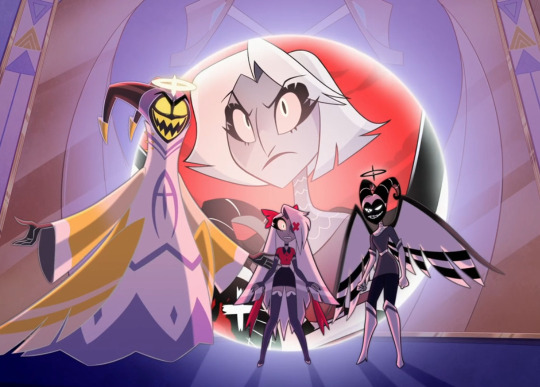
If vengeance was what was really driving her character then Vaggie would be pushing Charlie to call out heaven. She would take some impulsive actions to strike back that put Charlie’s goals in danger. She wouldn’t be the one telling Charlie to keep a cool head or singing about supporting Charlie no matter what.
This is the issue that’s been plaguing Vaggie this entire season. So much of her character has been tell rather than show. We were told by Husk that Vaggie hates herself. We were told by Carmilla that Vaggie was driven by vengeance. When Vaggie is faced with the decision to support Charlie against heaven or side with heaven to keep her secret the narrative lets Vaggie just not make a choice.
She doesn’t get to show her character and flaws through her actions. At least not the ones the show says she has.
I think this problem is a bit more obvious because when the show does build up something with her character it is really good.
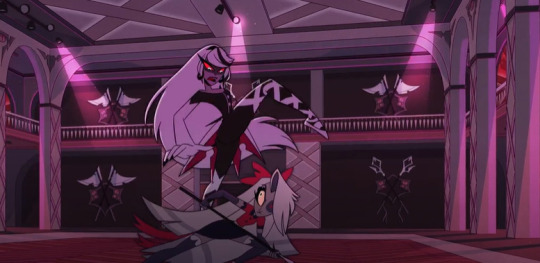
Vaggie being the one to reach out to and convince Carmilla to help their cause is a great beat. We see early on that Vaggie isn’t a people person. She has trouble trusting and/or inspiring others, but here we get to see her reach out to and connect with someone else, and it's through this understanding the two have that she is able to get Carmilla to help her (by training her to fight angels) and the hotel (by providing weapons).
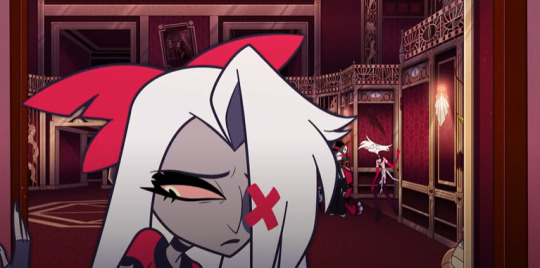
This exact struggle is also reflected in the moments with the hotel residents. Throughout the season Vaggie has always come across as being on their level. Charlie is well-meaning, but because of her privileged upbringing she has a very black and white view of redemption and struggles to deal with the more serious mental health issues that the hotel residents face. Whereas Vaggie is more jaded and has made massive mistakes in the past.
The other hotel residents can understand her struggle to do the right thing and redeem herself, which is why it was impactful to have Vaggie be the one to let them know that they can leave and that she’s the first one to see that they stayed. It emphasized the connection between them.
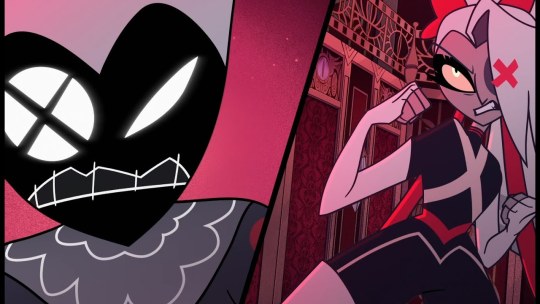
Vaggie’s fight with Lute was also amazing. Lute was the angel that cast her out, ripping out her eye and cutting off her wings. There’s a personal connection there that makes this battle investing. The way their battle ends really emphasizes the conflict between Charlie and heaven in episode 6 by showing that Vaggie, someone cast out of heaven, is more worthy of heaven and angel wings than Lute, Adam’s right-hand woman, through her decision to choose love over hate and spare Lute’s life.
It’s these moments that show the full potential that Vaggie has as a character and put the moments that they fumbled in stark contrast.
I really like this show, but I do think it has flaws. Vaggie’s character is a prime example of how the pacing of this season made certain character arcs suffer.
I'm hopeful that the show can improve on some of these issues now that it officially has a season 2 and that it was the biggest animated release on Amazon Prime (which is impressive because The Legend of Vox Machina had the massive already established fanbase of critical role watching it). I really enjoyed watching this season week to week and can’t wait for what they have in store for us next.
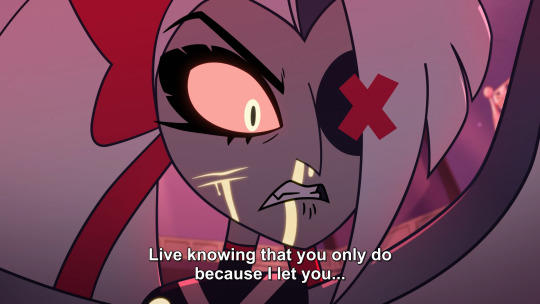
Side note: The moment where Vaggie spared Lute is where she should have gotten her angel wings and specifically she should have gotten Lute’s angel wings. This would just heighten the thematic importance of this moment and show through Vaggie’s mercy– the very thing that got her kicked out of the exorcists– she has shown that she is more worthy of being an angel than Lute. I can’t take credit for this. I heard it from Sarcastic Chorus.
#hazbin hotel#hazbin hotel vaggie#vaggie#vaggie vs lute#carmilla carmine#angel dust#husk#sir pentious#the show must go on#hello rosie#I love this show#it's so much fun#I like vaggie's character
142 notes
·
View notes
Text
“Just how low did you think I’d go before I’d self-implode, before I’d have to go be free?” is kind of the thesis statement to TTPD.
From the story being told in these songs, as well as what we’d previously heard, she sank lower and lower in depression (and self-harm) as the relationship disintegrated until it hit its final dying throes that she did inevitably snap, and for a time did self-implode. And in her case, the self-implosion came in the form of blowing up her life and running to another ill-fated relationship, because things has gotten so bad that *that* felt like a viable alternative to the life she’d been leading.
And in the depths of her pain, it *did* feel like freedom. (Not a coincidence that Fresh Out The Slammer follows shortly after on the track list.) Even removing the rebound out of it, having to cut herself off from that cage had to feel like finally letting out the breath she’d been holding in after the sharp intake of breath from YLM.
Everything that comes before So Long London could be interpreted as setting the stage and introducing the themes that culminate in this very moment: the suburban gothic fantasy of Fortnight giving an unwelcome glimpse into an unhappy future on the present course, TTPD laying the groundwork of the appeal of reconnection from the past and of the fantasy of the alternative, My Boy giving excruciating insight of being hurt by someone trusted and Down Bad succinctly painting a picture of the immediate fallout of the self-implosion.
So Long London is her jailbreak, but it’s also a treatise on the events leading up to it. She’s not just angry at the subject for not fighting for them, for not caring for her and for their relationship, for not acknowledging how much he hurt her. She’s asking, what other choice did you think I had? What else was I supposed to do? This was killing me and the only way I could end it was brutally because you wouldn’t take it seriously until I blew it and myself up.
There are so many parallels to You’re Losing Me, and many of us have clocked that this song is like the sequel to YLM with a little distance and perspective, but it strikes me that one of the parallel to “just how low did you think I’d go before I self-implode?” is “Every morning I glared at you with storms in my eyes, how can you say that you love someone you can't tell is dying?” She’d been saying for ages how this was killing her and showing in just as many other ways, all to be ignored as she fought on the frontlines of his army. It’s a picture of someone willfully ignoring the other’s pain, yet holding onto their indignation when that neglect leads to explosive results.
The rest of the album colours in some of the lines of that self-implosion: giving in to fantasies about someone else because her partner has turned away, running into the arms of someone despite the loud voices telling her he’s wrong, lashing out at others who have hurt her and continue to hurt her even in the wake of this latest scandal, the dawning realization that the quick-fix scheme is perhaps another spike in the road, the latest loss that leaves her unmoored and causes all these issues to come home to roost, the unparalleled anger at being used yet again, the pain of the spotlight in an industry ready to cut any woman down at the drop of the hat, and also finally finding someone who does cherish her and does realize they’re on the same team.
So if, as she says in the epilogue, that TTPD is a glimpse into a period of so-called mania, it’s the verbalization of the self-implosion she warned about in So Long London. She asked him rhetorically how low he thought she’d have to go before she lost it, and TTPD as an album ends up laying out the evidence to how low she did indeed have to end up before she was free of not only him but of the demons that had plagued them both.
(Hence why So Long London is absolutely important as a Track 5 because it *is* the breaking point that leads to the events thereafter in the story, and the foil to what she does eventually learn and find elsewhere. She did have to go be free and discovered plenty of other things as a result.)
#the tortured poets department#so long london#writing letters addressed to the fire#me thinking too hard about Taylor lyrics
52 notes
·
View notes
Text
Never to be seen again
Fandom: Baldur's gate 3
Characters: Orin the red, Enver Gortash, Ketheric Thorm, Vesper (Durge)
Ships: Durgetash
Warnings: Mentions of murder, mentions of blood, mentions of violence, suicidal thoughts
Synopsis: The dead threes chosen were meant to have a meeting to discuss their plan and move forward into a new phase. However, when Orin shows up without her sibling things get messy.
__
It was an important day, and Vesper, of all people, was late.
And honestly even if it hadn't been a pivotal moment in the plan, their tardiness was cause for concern. The Bhaalspawn was always so punctual, annoyingly so. Gortash drums his fingers on the table, avoiding Thorm's annoyed gaze, and stares intently at the meeting room's door. As the time ticks by the Lord lets his mind wander to the possibilities. Vesper losing themselves in their work, delving into the blood and viscera of their victims with a frenzied excitement of a starving Gnoll. Bhaal coaxing them to be more brutal, more violent. Them Gloating to their sister about how they had caused a more haunting scene than she could. The weapon of the God of Murder.
How bloody would vesper be when they finally showed up? Gortash would undoubtedly have to push them to take a bath before bringing them to bed. If he could convince them that is, otherwise his silks would be ruined.. again. Damn assassin was lucky Gortash was so smitten.
Finally the door opens, and in walks Orin. Her grin was particularly disturbing this evening, the glint of happiness in her eyes was beyond anything mere killing brought her. Gortash suddenly got a cold sinking feeling in the pit of his stomach. He keeps looking at the door, waiting for Vesper to follow their sister. Begging silently that the fear taking hold was just an over reaction. The changeling began to laugh at him as she sits herself down in Vesper's chair.
"What is so funny?" He snaps finally turning his attention towards the pale woman, "get out of your siblings chair Orin. You stand."
"You look like such a helpless pup," Orin's smile grows wider ignoring the order to get up, "waiting for its master to come home to share scraps from a hunt. Ah.. but they're not coming." The feeling of cold numbness spread through Gortash's body, he manages to remain stony faced.
"What do you mean they're not coming?"
"Just that, lordling. They're not coming. They're dead and gone. Flesh cut to ribbons, their blood watering fields and feeding rivers. Their corpse left for the flies."
Gortash shoots up so fast his chair nearly topples over. Orin is watching him, daring him to try something, begging him to give her a reason to skin him. Ketheric was quiet, but Gortash swore he saw a little tinge of empathy in the elf's gaze. Loss was something they were all familiar with. No. This was a lie. It has to be a lie.
"You're lying."
"I'd thought you'd say that," Orin coos and draws a dagger. She plunges it into the table and leaves it for Gortash to examine.
A slightly curved steel blade, guard inlaid with blue stones, a worn handle wrapped in black leather, and a silver pommel shaped like a dragons head. It was Vesper's. Gortash had it made for the Bhaalspawn, a gift, and a promise they'd rule Faerûn together. The man reaches out and pulls the blade from the table. He refuses to fall apart in front of the other. Refuses to give Orin that satisfaction.
"How?" he asked.
"They'd gotten sloppy, they lost our fathers favor, and I'm taking over now," Orin sounded far too delighted. It took every ounce of self control to not take Vespers blade and plunge it into the Changling's throat. She had done it. There was no doubt in Gortash's mind. As much as he wanted to kill her for taking away his love, he couldn't. the brain needed the three stones working together to remain under their command. They wouldn't be able to find another suitable wielder on such short notice.
Orin was necessary. At least For now.
"Seems we have a set back and won't be able to advance just yet," Gortash said, "Ketheric you will keep massing your armies.. and Orin.. seems you'll be the new representative of your father. Duke Ravenguard will be arriving at Waukeen's rest tomorrow. we'll have him on a leash shortly."
"Just a setback?" Orin sounds amused her brow quirked. "I'm impressed at your callousness, I thought you'd be more... broken. Crying over your lost plaything. But perhaps you'll just get a new one."
"We have work to do Orin," Gortash growls, gripping the dagger tight. "Return to your duties the both of you. I will figure out a way to keep things running smoothly." The man turns on his heel and storms out of the meeting room without letting either of them speak further. He manages to keep his cool up until he enters his study. as soon as the door locks the rage and sorrow hit him like a tidal wave.
Gortash lets out guttural screams, cursing Orin for killing the only person who showed him anything other than brutality. Cursing Vesper for leaving him, for destroying what little happiness he had. How dare they make him care only to disappear! Without a word without letting him say goodbye! He goes on a rampage through the room, tearing up projects, smashing chairs to splinters, flipping his desk, scattering papers and ink pots. All he could see was red, the emotions consuming every fiber of his being.
He had no idea how long his rage lasted. Only that when it was over he was completely exhausted and every inch of the study was completely destroyed. The man sinks to the floor, he was still holding Vesper's dagger. He regards the weapon a moment, testing the edge against his thumb. The Bhaalspawn kept the edge razor sharp, it didn't even hurt as the blade drew blood from Gortash's finger.
It would be so easy to join them. Just draw their sharpened blade across his throat and let darkness take him. This whole plan had been both of their ideas, they had wanted to rule together. They spent countless hours bent over books drawing up their plans and spent countless nights tangled up together figuring out how to get the stone and the crown.
What was the point of building an empire if you lose the one you wanted to build it with?
A shudder ran through him, he could sense Bane's presence in the back of his mind. The god was quiet, but his presence alone was enough to make Gortash hesitate. There was an air of anticipation, daring the man to go through with his foolish little plan. To die and face the consequences. Bane would consider his death a failure on the man's part, and Gortash's soul would burn for all eternity in Bane's fires. And that realization brought on a new one that nearly made him sick.
His soul belonged to Bane and Vesper's belonged to Bhaal. Gortash would never see them again.
Not in this plane or the next.
#baldurs gate 3#bg3#enver gortash#baldur's gate 3#bg3 durge#orin the red#bg3 orin#bg3 fanfic#fanfic#baldurs gate fanfiction#durgetash#gortash x durge#baldur's gate iii#tw mentions of violence#tw: mentions of murder#ketheric thorm
65 notes
·
View notes
Text
the horrifying what happened to aemma in episode one about this is that it is only when the woman is ACTUALLY dying or are already dead that c-sections are performed. that told me they do not care of about the historical telling of the story AT ALL. so i just wanna break down the situation and why i dont think that scene in episode one was necessary in the way it was.
now we have a precedence of this shown in the form of queen dowager alyssa velaryon in f&b. the first birth of her marriage to rogar had not been good, she was already weakened by that and her second pregnancy in the marriage was worse, to the point she was dying.
the maester informs that alyssa was already dying and that the only solace they could give is dreamwine. if she had consented or never woke up, we dont really know - but either way the baby, jocelyn, would actually die if they hesitate longer and that if nothing is done, alyssa could take the baby with her as well.
so jaehaerys and alyssane are told and its jaehaerys that tells rogar - that alyssa is dying and the babe could be as well, but they would have to cut her open. rogar was horrified but its something that had to be decided. yet it was a hard choice to make, because no matter the outcome, there would be pain and death - brutal one at that.
but because alyssa was already dying, it was offered as an option and hence it aligns heavily with the medieval standards. in fact, we can find this in a book by historian renate blumenfeld-kosinski called not of woman born where she talks about this.
there's a passage where she mentions saint thomas aquinas and the conundrum of conducting a c-section as soon as possible to annoint the child in holy baptism, to 'save its soul' from damnation — which details a conversation but saint thomas wrote against that, in defense of the mother and explicitly details that he rejects killing the wives.
if the mother is already dead but child is still alive, that's where you move to cut open because the child would die just the same as the mother. thomas rejects the idea that you should kill the mother in order to baptize the child. it is so interesting that the church is against abortion, but one of its outspoken individuals has this sort of perspective.
in fact, there is a passage on three instruction manuals for women's health and medicine called trotula (the little work of trotula) in medieval italy in the 12th century. the midwives who study these texts are encouraged to take care the mothers first. this was at a time where people are HIGHLY religious and would have caused such a social taboo. it was a shock wave to the population seeing these radical ideas for the first time.
the text on c-section on the trotula goes as follows: "whan the woman is feble and the chyld may noght comyn out, then it is better that the chylde be slayne than the moder of the child also dye." - which means it was highly encouraged that they ONLY CUT when the woman is already dying or is dead. this text tries to tells that the mother and child need tp be looked on but women need to be cared for as much as the child. if there is any other way, it should be taken. only in the event of no more choices should there be cutting.
in fact the woman who was behind ideas in trotula — trotula of salerno was a radicalist in her time. she believes both women AND men can have defects. specifically how men's semen can be medically unfit to conceive a child. and that WOMEN should not be suffering at child bed, discussing the use of opiates from herb plants to help with pain and just like saint thomas, she believes that women are not meant to suffer or die from childbirth and that women should not have to make up for the sins committed by even in eden.
in fact, c-sections were also heavily regulated by local authorty. jakob nufer in 1580s for example was a veterinarian who found that his wife was having such a hard time with childbirth that he was so concern and begged to be allowed by local authorities to perform a c-section on his wife because he feared she would die and he succeeded, which his wife surviving AND that child living a long life according to the records.
historians have said that this would not happen just without any reasonable cause to do forced c-sections on their wives for the fact that their wives are also belonged in other royal houses and strong noble families. the people in charge needed these alliances and connections in order to keep the peace going. foul play cannot be a must, the childbed is risk enough for these alliances already. marriages and childbed tied the peace together. alas, the best childbed care is a MUST.
aemma's death would have been fine as a regular death in childbirth or even a similar situation as alyssa's, which would have at least dignified her death. unless it was the natural progression of childbed and or foul play, aemma arryn would have no need to die like that on her childbed. this was not a good way for aemma to die.
it was just insulting to the book material, historical record and aemma herself. not to mention to viserys i. losing his son was tragic enough but having him decide prematurely without her consent, without her actually nearing death or without discussing it in depth with the maester and or not insisting any other way was so off to me. he would have been making a bunch of questions, this was his wife - she was tied to house arryn and she was a high ranking woman. he would not HAVE had her cut open like that when she was not dead yet or actually on her death bed.
#hotd#house of the dragon#asoiaf#hotd meta#asoiaf meta#a song of ice and fire#house targaryen#aemma arryn#viserys i#viserys i targaryen#alyssa velaryon#rogar baratheon#alysanne targaryen#jaehaerys targaryen#jocelyn baratheon
146 notes
·
View notes
Text
What is your favourite Doctor Who story?
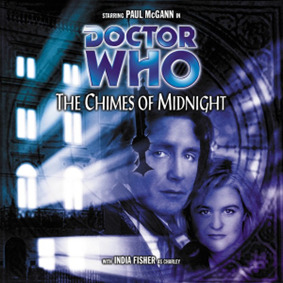

ROUND 2 MASTERPOST
synopses and propaganda under the cut
The Chimes of Midnight
Synopsis
'Twas the night before Christmas, and all through the house not a creature was stirring...
But something must be stirring. Something hidden in the shadows. Something which kills the servants of an old Edwardian mansion in the most brutal and macabre manner possible. Exactly on the chiming of the hour, every hour, as the grandfather clock ticks on towards midnight.
Trapped and afraid, the Doctor and Charley are forced to play detective to murders with no motive, where the victims don't stay dead. Time is running out.
And time itself might well be the killer...
Propaganda
"Christmas wouldn't be Christmas without one of Mrs. Baddeley's plum puddings." And Christmastime wouldn't be Christmastime if I don't re-listen to this audio story at least once each year. (@youremyonlyhope )
It just wouldn't be Christmas without it (anonymous)
Minuet in Hell
Synopsis
The twenty-first century has just begun, and Malebolgia is enjoying its status as the newest state in America. After his successful involvement with Scotland's devolution, Brigadier Alistair Gordon Lethbridge-Stewart has been invited over to Malebolgia to offer some of his experiences and expertise.
There he encounters the charismatic Brigham Elisha Dashwood III, an evangelical statesman running for Governor who may not be quite as clean-cut and wholesome as he makes out. One of Dashwood's other roles in society is as patron of a new medical institute, concentrating on curing the ills of the human mind. One of the patients there interests the Brigadier — someone who claims he travels through space and time in something called a TARDIS.
Charley, however, has more than a few problems of her own. Amnesiac, she is working as a hostess at the local chapter of the Hell Fire Club, populated by local dignitaries who have summoned forth the demon Marchosias. And the leader of the Club? None other than Dashwood, who seems determined to achieve congressional power by the most malevolent means at his disposal...
Propaganda
this is objectively bad but i have also listened to it at least five times (october)
52 notes
·
View notes
Note
Why Lucifer being a good person is fucking stupid:
So in the show canon Lucifer and Lilith were kicked out because they were dreamers and gave Eve the fruit of knowledge. Based off the lore of Helluva Boss Lucifer 99% is the sin of Pride. In the show Lucifer is just a quirky theatre major who just wants to reconnect with his daughter...
Ok so lets analyze why this does not make sense in the worldbuilding. Lucifer is the King of Hell, a.k.a. a place full of homicidal maniacs and various other people. And since angelic weapons can harm angels (which is stupid btw) and sinners have been stealing weapons left behind by angels... Lucifer logistically cannot be a good person because these people could just decide to try to murder him if he was too weak. He needs the sinners and populace to fear him or respect him. Since Helluva takes place in the same setting Lucifer must have put in the social hierarchy of hell, approved it or doesn't do anything about it. Which means he plays some part in Stolas and Stella being forced to wed and the imps plus hellhounds being treated like garbage.
Then we get into story construction problems. Like if Charlie and Lucifer have a good relationship instantly then almost all the problems in the show can be solved at a snap of a finger because of Lucifer's power level. Its a similar problem with Alastor but worse because Lucifer is stronger. Like Alastor tho is implied to be weakened and forced to do this so there is intrigue storywise and limits on his personality and power. Lucifer is angel and can just like idk zap the Vees. Theres no threat, risk or anything now.
Also this Lucifer may have slept with Eve which either implies he cheated on Lilith or Adam was cheated on twice and Lucifer also agreed with genocide
And what wouldve been better is Lucifer being a shitty dad or person WHICH WE HAD IN THE PILOT. Like Lucifer being awful is actually better for the previous reasons and Charlie's own character. Like Charlie is supposed to be an underdog despite being princess and has an impossible task and if her father doesnt believe in her theres another personal level to then and maybe some of the audience could connect with her. And if Charlie's dad hates her or something you could easily write in and make Charlie struggle more by having him cut off her resources. Heck if her dad is awful then you can write in how Charlie feels about being so morally different. Then slowly build up to when we see Lucifer for the first time and actually have it feel special
This just makes me missed the pilot even more. While it did have it's own problems with the worldbuilding and characters, a majority of its ideas were still believable.
A better angle for Lucifer would be if he was a morally grey character. He can still be a decent father but a terrible ruler. Of course, that angle wouldn't work because everything in this show has to be black and white, where it literally tells you in a song, "Cause the rules are black and white" despite the same show critiquing its Heaven for the same black and white thinking.
I'm not against the idea of Lucifer being a decent father because there are still other ways the show can create conflict between him and Charlie. For example, he does get her the meeting into Heaven but it's at a cost. If she's unable to convinced Heaven, she has to abandon the hotel. Or maybe he is skeptical of Charlie's idea so he makes her overcome the hotel's problems, like the Vees, alone, to prove how strong and passionate she is. Of course, if they hurt Charlie, he can easily kill them, but it can serve as a great character moment for the both of them. Charlie learning Hell is brutal, Lucifer now hating the hotel because it will hurt Charlie, and create a new conflict where Charlie and Lucifer are against each other. Or the fact Lucifer was the one who allowed the exterminations to happened and Charlie has to undo her father's actions.
I'm only focusing on Lucifer being a "good" person through parenting because almost everything else, he's a bad guy. Not only was this the same man who allowed the yearly genocide of the sinners but also he created the classist, racist social hierarchy and system in Hell, and let the pride ring become so awful, the overlords, a group of powerful sinners, are taking advantage of regular sinners daily.
53 notes
·
View notes
Text
Shitty Parent vs. REALLY Shitty Parent

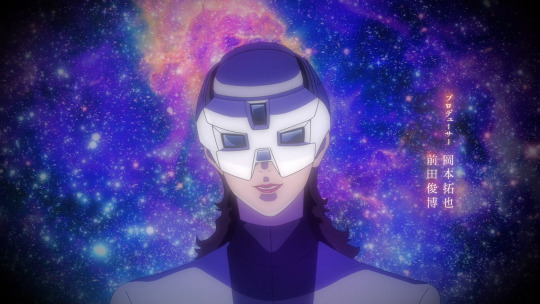
So I think this latest episode has finally given us a pretty good idea as to how Prospera Mercury and Delling Rembran act as dramatic foils to one another as the respective parents of our two main characters.


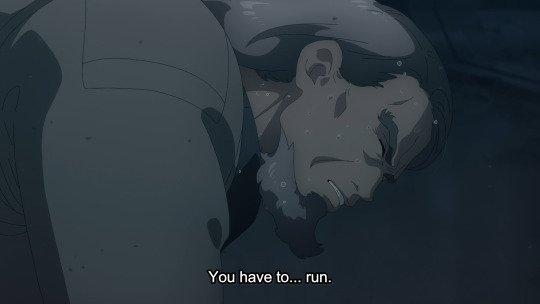
On the one hand, while it’s been hinted at ever since Episode 7, this episode confirms that Delling does genuinely care for his daughter underneath all that distant, aloof demeanor he’s always showing. We seem him in this episode take a proverbial bullet for Miorine at what was very nearly the cost of his own life, all while telling her to save herself.
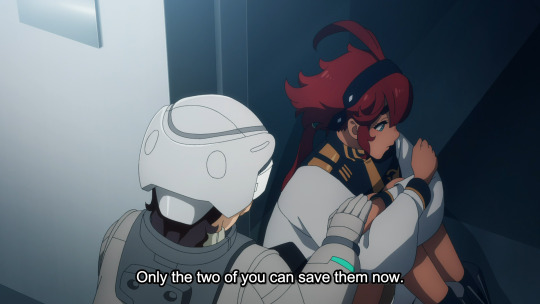

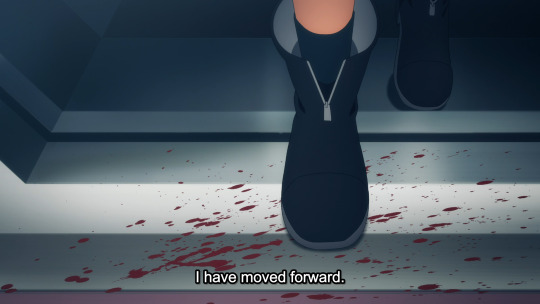
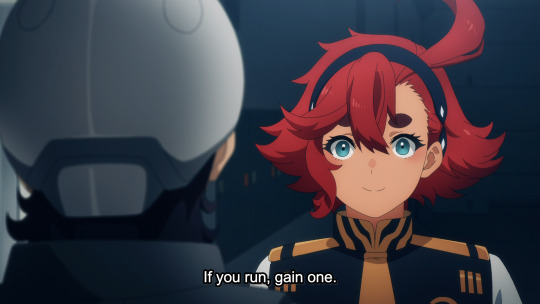
And on the flipside, this episode also seems to have given us a hint of the true scope of what seems to be Prospera’s manipulation of Suletta. How despite the open care and affection Prospera shows Suletta, it’s clear that she’s also been manipulating and grooming Suletta into becoming an outright killing machine who brutally cuts down her enemies without batting an eye. To the point where it even seems like Prospera may have even subjected Suletta to outright psychological conditioning and indoctrination, given how Suletta bounces back from a major traumatic breakdown once Prospera said a certain phrase to her.
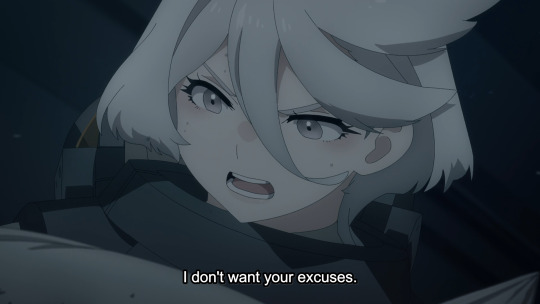

Now this isn’t to say something like ‘Psyche! Delling was actually a good parent all along and it’s PROSPERA who was the terrible parent!’. Delling is still absolutely a shitty father, plus it’s been pretty clear that Prospera wasn’t going to be a ‘good’ parent given how she’s acted shady as fuck basically from day one, particularly is you read the Star Cradle short story.
Rather, what I think we’re seeing here is that rather than the full-blown antagonistic, villainous ‘Big Bad’ parent he may have been initially set up as, Delling is more simply the ‘dysfunctional’ variety of shitty parent. IE; the kind who’s always loved and cared deep down for their child but has never been able to show it due to their own baggage/trauma/ego.


Essentially, Delling seems to have a lot in common with Gendo Ikari, complete with a tragic dead wife.
In contrast, in we’re continuing the Evangelion parallels, then Prospera could be likened to one of the darker interpretations of YUI, as the protagonists mother who acts loving and caring but is actually the true mastermind behind everything in the story. Not to mention if Eri really is in Aerial, it would basically be the Unit 01 situation just flipped on its head.
Or put another way if we look at a previous work of G-Witch’s writer: Delling is a subversive take on Charles Zi Britannia who turns out to not actually be the big bad, and Prospera is a take on Marianne who’s allowed to ACTUALLY BE the big bad.
Basically, both Delling Rembran and Prospera Mercury are shitty parents. The key difference is that Delling is the ultimately more benign ‘dysfunctional, stoic distant father who sucks at feelings but does genuinely want his daughter to be safe deep down’. Meanwhile Prospera represents the much more concerning case of ‘basically a cult leader who’s used her open care and affection to damn-near brainwash her daughter in being an actual killing machine’.
#gundam#gundam witch from mercury#g-witch#g-witch analysis#Suletta Mercury#Miorine Rembran#Prospera Mercury#delling rembran#evangelion comparisons#code geass comparisons#why delling rembran is a shitty parent#and why prospera is a WAY MORE shitty parent
268 notes
·
View notes
Text
From the Inquisitor to the Baptist: The Evolution of John Seed

Deducing John’s personality from early development pictures is not easy… Still, it’s possible to make conjectures based on his appearance and attitude.
All the sources and references indicated by the superscript numbers will be given in the last post.
Part 3: Personality and morals (concept art, promotional content, and side material)
In the early portrait of the Seed family¹, John’s formal and stylish outfit suggests he’s probably wealthy and takes care of his appearance. In contrast, the blood running from his knuckles, which can either be his or belong to someone he has recently punched, hints at the fact he’s a violent man. The way his foot is almost triumphantly resting on the crate gives the impression that he’s self-assured and not easily impressed. I would describe this John as a “classy criminal”: sophisticated on the surface, but also cold and brutal.
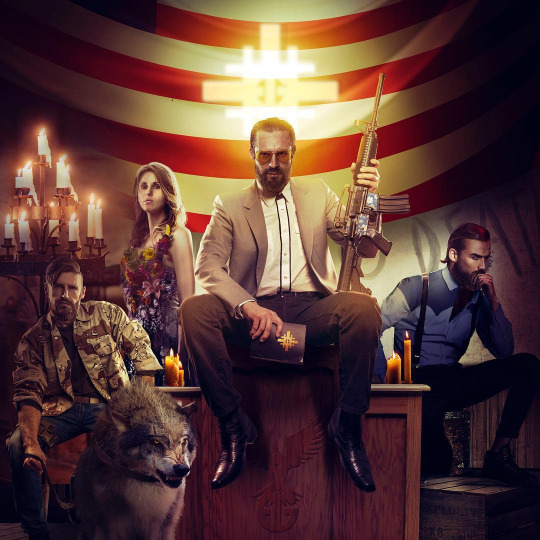
In the two promotional images inspired by The Last Supper², as well as the development visuals for the pictures³¯⁴, John looks confident and stylish again, wearing expensive-looking clothes and accessories.

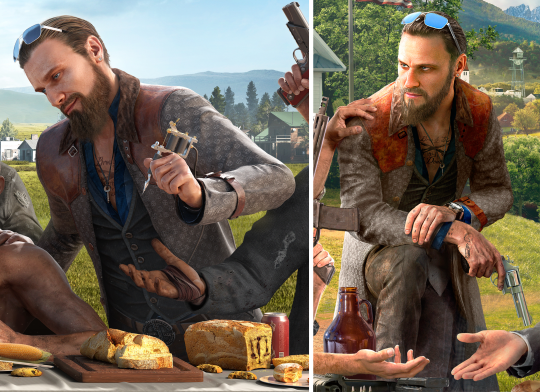
In the first “Last-Supper-like” image, his smile is almost cocky and he apparently has just finished tattooing someone against their will.
In the second, he has a vaguely menacing look on his face, a revolver in his hand, and his foot resting on something (probably a chair or bench), which conveys a feeling of self-importance, self-confidence, and dangerousness.
His infantry tattoo might indicate that he was originally going to have a military background, but nothing is certain.
Far Cry Absolution was the first time John was given a “voice” and we could learn more about his personality. While the book was not written by a member of the Far Cry 5 team, its author, Urban Waite, explained in an interview that he got to meet “various heads of development”, such as Dan Hay (Executive Producer, Creative Director, and Writer)³⁸. What he wrote is based on the information he was given at the time, and it most likely had to be approved by Ubisoft, so even though not everything in the novel is still relevant, I think it’s a good indicator of what John was like in the game’s early stages of development.
In the interview, Urban Waite described him as “a loose cannon” (compared to Joseph) and Absolution’s “main bad guy”, but he doesn’t think they’re “completely evil”.
In the book, John is self-confident, calm, and speaks eloquently. When he threatens people, he does it politely, as if he’s simply asking something, but people know they don’t really have a choice... On page 48, he shoots at a bear with a rifle. He doesn’t kill the animal, which then runs away, but this scene is surprising because he never hunts in Far Cry 5, and no one says he likes to do so. That said, his ranch is still decorated with taxidermied animals, so maybe hunting indeed used to be one of his hobbies at some point during the development of the game.
In the novel, he clearly has faith in the Project. He still Cleanses people before hearing their Confession, gives them a tattoo that reveals what he thinks their sin is, and makes them Atone by cutting it out. Like in the game, while he uses Bliss to pacify the converts, he still asks for their consent. He explains to Mary May that Eden’s Gate can give her a new life and that they can be a family. She needs to Atone so her sin will not stand before her and the gates of heaven, and he can save her. “You have been alone”, he says on page 116. “You have lived without the word of The Father and now you will be alone no more.”
The hunting and the constantly calm demeanor seem a bit odd, but his beliefs, methods, and even “showmanship” (page 145) at times are consistent with what John does in Far Cry 5.
There is one thing, however, that is not.
While it’s clearly said in the novel that Eden’s Gate forbids alcohol, and this is something John apparently takes seriously (he “asks” Mary May not to serve alcohol anymore and comments that Lonny, a cultist, was “not a true believer” because he was still drinking), it’s not mentioned anywhere that they also disapprove of fornication, as we know they do in the game. It’s very likely that the rule simply didn’t exist yet in the minds of the Far Cry 5 writers, but as a consequence, in Absolution, John has a lover. Her name is Holly, and this is what she tells Will Boyd, the protagonist, on page 101:
I fuck John from time to time and he tells me shit. He tells me shit I shouldn't hear. I don't have a fucking clue about half of it, but the other half is fucking out there. The Father and his scripture and all this shit about the prophet and the coming fire of Hell. Sinners and saints. Salvation and damnation.
While Holly’s language is surprisingly vulgar for a cultist (compared to the way they talk in Far Cry 5), the fact that she reveals she sometimes sleeps with John is even more disconcerting. Not only is she also a member of the Project, so it seems strange that she would openly and shamelessly admit she regularly breaks its rules, but as I’ve just mentioned, John also seems to want to follow and enforce the rules, so being in a relationship with someone sounds out of character. Holly even says the “thing [she has] with him” is “serious enough to have [her] waiting” for him outside at night.
I can’t see this happening in Far Cry 5 at all, and while a character named Holly is mentioned (Holly Pepper, Henbane River) and they tried to make it look like she was the same woman, the Holly from the game has a different address and backstory, as well as a girlfriend named Charlie³⁹.
But, again, the “no fornication” rule most likely didn’t exist when Urban Waite wrote the book, so John didn’t technically break it in Absolution. While this seems out of character now, the novel suggests that, several months before the release of the game, it wouldn’t have been absurd for John to be in a sexual relationship with another cultist. To me, this is proof that his personality, as well as the Project in general, changed. And if the rule did exist at the time, that would mean John used to be a hypocrite. As you will see, other things suggest this was true at some point…
In Inside Eden’s Gate¹², John is eloquent and still has a vaguely menacing aura. His self-confidence is once again palpable; he looks like a man who’s totally in control of whatever situation he’s in and knows what he’s doing. He introduces the Father to a crowd, is in charge of baptizing new converts, and even actively helps track and find the movie’s protagonists, not once losing his cool or air of confidence. He looks even more stoic than Jacob, which is quite unusual if we compare this version of the two brothers to their in-game counterparts.
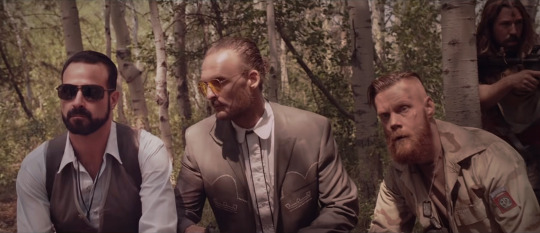
Like in Absolution, while it’s clear that he won’t hesitate to threaten or hurt people, he seems to always be naturally self-assured. This man looks a bit cold and scary, but he also seems emotionally mature and stable, and this is far from being the case with John in Far Cry 5. However, nothing in the film suggests he doesn’t believe in Joseph and the Project’s doctrine.
In the live-action TV spot “Anything Can Happen, Everything Will”¹⁵, we only briefly see John, but he looks the same as he does in the film: calm, confident, and not to be messed with:

In The Book of Joseph²⁰, as a child, John is described by his brother as “delicate” and sensitive. When he was adopted by the Duncan family, they essentially tortured him for years, thinking “the Evil within him had to be exterminated”, and they “turned an innocent child into a monster skilled at concealment and full of suppressed anger.”
When Joseph found him as an adult, he had become a lawyer, and while “physically, he was society’s very model of success”, John Duncan was also a heartless chameleon, able to show other people the face they wanted to see, so they usually felt comfortable enough to tell him everything, even their darkest secrets… and he could then (potentially) use that information against them.
He was rich, partly because he had inherited his parents’ fortune when they died, and powerful thanks to his job and numerous connections, but deep down, he hated everyone and everything, himself included. He was also suffering from a drug and sex addiction. After he was reunited with Joseph, John Duncan was free to become John Seed again.
While he’s still the Project’s Confessor, he’s not in constant disguise anymore or as full of hatred as he used to be. In the game, in the mission “The Confession”, he also briefly mentions his abusive parents, how their violence changed him, his past addictive tendencies, and how Joseph helped him see life differently, so the book doesn’t contradict what Far Cry 5 tells us about John; it only gives more details about his backstory.
In the video “Far Cry 5: Why John Seed Is Your Charmingly Deadly Enemy”²¹, Dan Hay (Executive Producer, Creative Director, and Writer) and Jean-Sébastien Décant (Narrative Director and Writer) talk about the character. The latter explains that John is almost “in charge of PR” for Eden’s Gate, but also that he’s “the most tormented and psychotic one” because of what happened to “the cute kid” he was. He also says it was Joseph who “brought him back on track” but that, now, John always wants to impress him, sometimes to the point of almost “[losing] it” and having to be “reigned back in”, and this is what makes him dangerous in the game.
As for Dan Hay, he says John has experienced “great trauma in his life” and, because he has survived it, “almost feels like he’s a superman”. He is a “potent character” who has been through everything, can hardly be surprised anymore, and “almost knows everything the player is going to do”. He also mentions that John mostly wants to impress Joseph and that this affects their relationship because, by trying too hard, John usually ends up not doing things right, and Joseph then has to intervene.
By the way, this is also what Drew Holmes, the game’s Lead Writer, explained in a now-deleted interview⁴⁰:
John Seed, who is the youngest, sort of wants to be recognized by his older brothers as having value. But he continually screws up, so Joseph chides him saying he’s not doing the things [he’s] supposed to do.
Dan Hay also says John is a complex villain who does “bad stuff” but will not hesitate to tell the Junior Deputy, the protagonist, that they aren’t irreproachable either. For the first time, the two writers also talk about John’s philosophy, The Power of Yes. They explain how it stems from his childhood and how he uses it for the cult, sometimes to the point of excess.
What they explain in the video is totally consistent with The Book of Joseph and what we will later see in Far Cry 5, but it contrasts a little with the John Seed we had previously met in promotional material, Far Cry Absolution, and Inside Eden’s Gate. This new version of John is more emotional, not as calm and collected as early versions of him seemed to be. He has evolved as a character, and deep down, he became quite tortured. He’s not as self-confident as he appears, and he strives to impress the Father because he cares a lot about his opinion.
More evidence of this evolution can be found in early and deleted content for the game.
To be continued…
#far cry 5#john seed#joseph seed#jacob seed#faith seed#far cry absolution#inside eden’s gate#the book of joseph
81 notes
·
View notes
Text
Hi. I'm bored. And incredibly sleep-deprived. So let me try and fix the loopholes Larian left behind when doing that whole durge/chosen of the dead 3 plotline.
Let's start with the obvious: Durge is a titan. Even if we ignore that Durge is what would happen if Bhaals pinkie decided to gain conciseness of its own, Orin is brutal. She's strong. And while she's a chosen, she's also a 2nd Gen Bhaalspawn. She hardly has any "taint" worth mentioning that could enhance her abilities, no divine spark, but Durge does. Pretadpole Durge is a menace and a savage. Look at Gortash's decked-out stats while being only level 9 and the thinker rather than the murderer. Durge most definitely was even more fearsome before the parasitic nerf.
With that established, let me claim the following: Durge is immortal. Age, sickness, poison, etc can not kill them. But legendary weapons can, although even in that case, by the grace of being a titan, Bhaal can revive them if he wants to. They are not invincible or smth. They can be hurt and all, but the damage wont be as severe for most instances, so long as there arent any cut off parts or scooped out brains. Durge would need the proper revival to reclaim that, really rebuild the body u know? Well, this also means Kressas little fun project could've never killed Durge. They would've simply felt like they were dying the entire time without getting the sweet release that would've been death. Or maybe at one point they did, but seeing how the Absolutes plot wasn't done yet Bhaal immediately pressed the undo button.
Speaking off, Durge longs for death. They see beauty in obliteration. It just sucks they can't die until Bhaal allows them to. This also explains why they're still alive and why Bhaal killed them in a redemption ending. It takes a deity or a legendary weapon to kill a titan.
Regarding weapons, guess how exactly the alliance didn't falter for as long as Durge was there but shattered the second Orin took over? Neither Ketheric nor Gortash have a legendary weapon. Orin is the only one who does, and it's a ceremonial blade set she most likely stole off of Durge's knocked-out body. Even if they wanted to kill Durge, before the plan concluded, they could hardly do it, and even if they had wounded Durge severely, they would've killed them first before Daddy Bhaal would revive them because their job here wasn't done yet.
It takes another titan or a god to kill one, so the only people capable of doing so are Bhaal and Durge. Sure other gods, too, but they're forbidden from meddling, and everyone still remembers what happened the last time a certain Tyrant pissed off Ao.
As for why Orin attacked them? Siblings. That's the only explanation you need, really. Durge prayer probably pissed her off, and she just did the sibling thing, that is, maim her bloodkin. Probably stuffed a tadpole in there when Durge didn't get up in time so Orin would have an excuse before Bhaal.
This also gives us 2 options why Gortash did nothing despite expecting the Brain to transform.
1; better chances at killing Durge when it would eventually come down to it. A netherbrain infused with Netherese Magic (which is also Durges Origin btw, Bhaal was netherese himself) simply has better odds against a quasi deity than a human does.
2; he was convinced they'd ascend as gods themselves. Durge was already a quasi deity so the last bit wouldn't have been hard. And with a deity on your side surely even a netherbrain is no challenge.
Now back to unholy thoughts-
25 notes
·
View notes
Text

fine okay HBO human DT would be like
(tw blood, gore, drugs, suicide mention)
Beakley's husband was killed by their daughter, who was a FOWL big bad. Beakley loved her more than anything but, in the end, they couldn't stop her, and she locked her in an uncrackable limbo pocket dimension, took newborn Webby, and told everyone she was dead. Every night, she doesn't think about how she's still in there, alive and rotting. (I hc this regardless)
Gladstone signed away his soul for glitz, luck, and luxury when he was young. He rains gifts and affection down on the kids, decked in the best money can buy and bored by all of it, surrounded by designer drugs and sex and fancy friends and desperately lonely when he's not with the fam.
Pre-series, the boys' father was a traitor who sold them out, nearly to Donald and Scrooge's death. Della goes alone to a standoff in an abandoned plane hangar, fucks him good one last time to get close before beating his head in with a socket wrench.
Goldie told her how.
The kids figure out Gyro's fallen into a brutally accelerating addiction to a stimulant chem of his own design, bc its producing incredible results. Scrooge has been looking the other way. Because results.
Actual Scary Girl Webby in a real way. She wants answers, and has no understanding of taboos. Stares at her first dead body way too long. Asks della too many questions about self-amputation, what it smelled like, if she could feel the difference between muscles and tendons when cutting. Did the ligaments snap back? did the bone splinter? did you see marrow? She just wants to know. The next day she asks bentina if they can get a whole pig to pit-roast and if she can be the one to carve it. Watched Scrooge and Goldie from the vent in his bedroom, looked too long at the line of Goldie's back as she moved and thought about it all night.
We see Beakley actually homeschool them. They have a library thats the school room, and Huey and Webby practice cello in Webby's room. They test themselves on new languages they're learning together by talking through music theory in them while playing.
Huey made Della a teak shower bench. Not HBOcore but its true and you should know it. It replaced the chrome one, and on bad nights, she hands out in there in the steam at 4 in the morning bc the room is bright and warm and the fan is loud and beakley'll be up in an hour which means the house wont be Still and Quiet.
Louie actually gets caught up in the underground crime scene. He slowly builds confidence gets too cocky, and gets in deeper and deeper shit until it goes south. Fast. His tricks dont work, because hes TEN, and Goldie has to pull him out of a human trafficking ring. He doesn't think to ask what she was doing there until much later, and she's already gone.
We see Donald's therapy sessions. He loves the boys more than anything or anyone in the world. He tells his therapist that he hates his sister for what she did to his future. His therapist asks if he hates the children, too, and Donald hesitates. He loves the boys.
Magica has Scrooge for weeks during the Shadow War. Plays out all his failures in shadow puppets on the wall for him. The spear, his parents, his sisters, goldie, everything. she was there in the dime for the whole ten years he was alone, and she plays out all the ugliest things he said and did. Shapeshifts through all the friends he's lost to taunt him, spitting words as young Donald. She shifts into Della, asking in her voice why he'd do that, telling him how painful it was, how it feels to freeze to death, what human lungs sound like when there's no oxygen to breathe. You'd think they'd be quieter, but there's a wet crackle that sounds like a sponge. She tells him how he was going to kill the boys, too, because he's too selfish, but it's not a problem now, because they've left again. They're safe now. But she says it all so kindly. He's exhausted and hes starving and hes half out of his mind, so when he asks what she wants from him and she puts a knife in his hands and tells him to end it, he does. Until the knife turns to smoke, he's unharmed, and it's not della but Magica who's laughing at him. Lena sees the whole thing, and later on, when the kids find out, Scrooge omits details, and the kids laugh at how Magica would ever think Scrooge would go through with it, just give up. He'd never give up. Lena doesn't say anything, and Scrooge doesn't look at her, and he has to cope with believing that'll be the last time he'll ever hear della's voice.
Lena Comes Back WrongTM
anyway you get it. everyone has a really rough duality. feel free to add.
(this post got too long, ask me later about the boys' birth and scrooge's secret s1 curse)
#animation studios if you see this in 5 years when I’m applying I’m not weird please still hire me#HBOTales#yeah I'll make that a tag#ducktales#dt17#tw gore#tw drugs#tw body horror#tw suicide#tw self harm#I deleted several things bc i want to be able to look you guys in the metaphorical eyes again at some point#wait I’m kind of cracking up at the idea of Lena watching all of that play out she has NO idea who that is or what happened#she’s like…I don’t even go here…
59 notes
·
View notes
Text
Godzilla Minus One thoughts (SPOILERS)
TLDW: Godzilla Minus One is easily one of the all time best films in the franchise so far. While it isn't my personal favorite, it absolutely deserves the praise fans and critics seem to be giving it. Outside from some personal nitpicks, I'd say this entry is worthy of standing shoulder-to-shoulder with the best.
10/10
THOUGHTS AND SPOILERS BELOW THE CUT!!! GO SEE IT!!!!!!
Boy does this movies come in swinging! Koichi setting up the main conflict of feeling like he is a coward (he's not, as the movie goes on to point out) and then the whiplash of GODZILLASAURUS
I know its just an unmutated Godzilla but HOLY FUCK the similarities are there and I love the design.
Personal nitpick #1: was hoping the movies would go more in depth with the origin of its Godzilla but the movies isn't really about what Godzilla is but rather what he does and represents to the story. As a result they don't really say what he is other than he is known to Odo Island's folklore. I like that, it gives him a mysterious vibe.
I gasped because I thought he ate a guy be then he yeeted him
Poor Koichi Can't Catch a Break the Movie
Noriko was great. It's clear she isn't used to being looked after and it shows.
Speaking of which, ALL the characters are wonderful. The Reiwa era looks like it is being defined by stronger human characters and stories and I am all here for that!
I'm actually surprised that the trailers (or at least the 2 I watched) didn't show to much Godzilla action. Or at least the final battle.
Godzilla REALLY has it out for folks in this movie. That lack of a clear origin helps actually. His attacks are sudden and brutal. He is REALLY visibly pissed off too.
SPEAKING OF BRUTAL HOLY FUCK!!! For as much damage Godzilla does to everyone, he gets FUCKED UP! Half his face blasted off! It's cool the see his regeneration ability realized in CG
Personal Nitpick #2: I do wish they had made Godzilla a more obviously tragic character. He is just as much a victim of war as he is a symbol of it. Again though, that isn't what this movie is about, and the ending does at least suggest a sequel isn't completely out of the question, so maybe we can still see why Godzilla decided that All Humans Are Bad.
His atomic breath is wild man. Creating mushroom clouds and massive creators is some nightmare fuel shit.
NORIKO NOOOOOOOOO :(
(dont worry she lives)
The plan to kill Godzilla was interesting. Explosive decompression is not really the first thing I would have thought up for a sea monster that brings up deep sea fish but the speed at which it happens is important.
KOICHI NOOOOOO (its okay he ejected)
Personal Nitpick #3:... I don't really like how they defeated Godzilla. I thought it was overkill. Like, yeah I get that Koichi needs to have is moment and all but blowing his head up I thought was a little much. and then he crumbles away? I guess he was frozen? Cool visual though. I imagine it was hell to convince Toho to have Godzilla die that way.
I heard Yamazaki was a big GMK fan, and the last scene really makes it obvious. I wonder if he isn't available for a sequel, Yamazaki would request Kaneko to direct...
Hey Noriko is alive!!!! Hey what's that on her neck? Why does it look like Godzilla's dorsal plate? Oh God Please Let Koichi Be Happy He Has Been Through Too Much.
The overall message of the movie is so goddamn moving, Live. That isn't a request, that's an order, a demand. Live, you should be happy to be alive. You may not think it, but people love you. People can forgive you. You don't deserve to die. Live and fight for the next generation so they don't make our mistakes. It is tough but you and people around you can make it better. You. Will. Live.
41 notes
·
View notes
Text
BNHA AU: Villain's Quarter
Some areas of Japan are known officially as 'dead zones' or 'ghost towns'. Some were destroyed in the early quirk riots, some victim to a villain attack that resisted clean up, some the site of an attack so brutal the vast majority of the people living there left. They have no police, no heroes, but not no people. They are well populated, by those unwelcome anywhere else - the poor, the mutants and, most of all, the villains. Southwest Mutsutafu is one of them - the locals call it the Villain's Quarter.
Midoriya Izuku's mother dies a few days after he turns 13. Her funeral comes and goes, leaving Izuku all alone.
After Inko dies, Bakugo is nicer. Not nice, exactly, but on one memorable occasion he asks if Izuku's foster family is ok. Izuku cries, because Bakugo is the only person who would care to ask, and he cries because there is no foster family. He thanks him and tells him they are nice enough.
Here, the quirkless are considered legal adults at 12, he's already aged out of the foster system/any legal protections for children.
He has no money other than what was in the house - he knew his mother had a will, but he got nothing. She left him something - she told him, but apparently whoever was in charge of her will didn't see fit to give him anything. He was hungry. He was tired. He was so lonely.
Bakugo may have gotten nicer, but the other students had only become more cruel. He'd arrived to school only to see Bakugo throwing flowers out the window - the 'go join your mother' notes still inked directly onto the wooden top of his desk. A girl bumps into him, tells him she thought he was a ghost with a nasty laugh. A group of boys tell him to jump off a roof. A particularly nasty teacher asks him why he's still even here.
One month since his mother died, Izuku is done. He ran out of food 3 days ago, and he ran out of hope not long after. Entering the Villain's Quarter is said to be tantamount to suicide - so thats just what he does.
Shigaraki often wandered the streets of the villain quarter at night - Sensei ran the show, and everyone knew who he was. Those who didn't and tried to pick a fight - well.
He's not expecting to run into a kid - skinny and short, still dressed in his well worn gakuran. His eyes are empty.
Faced with what feels like an echo from his past (a little older, but he'd been just as crushed an alone and hopeless, without a hero in sight) he invites the kid back to the bar. He cringes a little, because hes some guy in the villain quarter inviting a cute little kid back to his place, that looks so fucked on so many levels - the kids gonna book it - But. The boy just nods. They get back to the bar in minutes, Tomura makes him a cup of tea (he can feel sensei's heartbreak at whatever way he must be ruining the leaves but thats sensei's problem).
He didn't really think he had much of a heart, but it sure fucking breaks when the kid asks him why he hasn't killed him yet.
(More under cut)
So! This AU features a much nicer AFO (he's trying to raise tomura well! hes. not great at it, but he is legit trying) who has morals of a sort. The morals include - touch children and die by my sword, quirk discrimination bad, and 'i will give u the chance to leave before i kill you, because im nice like that'.
He doesn't see the problem with experimenting on dead bodies - but hes not ok with experimenting on living people. Nomu are, as far as he knows, only made of dead people.
He, admittedly, just kinda likes being a villain. Crimes are fun, only some murder is bad, I like beating people up and stealing their quirks. The tale of him being a massive evil is. Kinda not true - he's just a theatre kid. But only OfA could beat him at this point so. Fair. He's not mad ab All Might beating in his face he's like "good fight. good fight - its nice to be on the ropes for a change!" All Might is not aware of this.
Tomura is also nicer! His aim isn't murder All Might, but defeat him so badly it destroys the stupid hero system. He doesn't hate All Might - well, he does, but he's aware that what he really hates is the system and All Might is just tragically easy to dislike if you are Tomura - but there are some people he's of the opinion that them dying is just an all round positive. He wants to murder them.
So when a very depressed baby Izuku shows up, they try to find out what hes doing so they can return him to the correct authorities and hopefully get him some therapy. Then they find out there are no authorities and they suddenly want to murder the whole government. All for One didn't want to rule Japan (too much effort) but at this point it seems like he straight up could not do a worse job than the actual government.
So, they keep him! Izuku helps Kurogiri around the bar and, eventually, starts cooking. Its the only restaurant in the villain quarter and its very popular - you can pay in anything with value (money, gold, information, a lot of drugs, weapons, one time just a whole puppy that Izuku instantly adopted). Izuku is actually kinda happy, for once. He doesn't agree with Tomura or Sensei, but he doesn't disagree - he helps with planning, and he and Sensei have a dedicated time each week were they play with some of his quirks.
Basically Izuku gets adopted by every villain in the prefecture. It is very stressful when you are Eraserhead, chasing up on a lead about a quirk analyst in the villain's quarter and you see a whole child wandering around some stalls selling very illegal goods in broad daylight like hes at a farmer's market.
#villains quarter au#bnha au#bnha au ideas#bnha#mha#heroaca#boku no hero#i like this au! the real villain is the government and the cops :)#like real life
208 notes
·
View notes